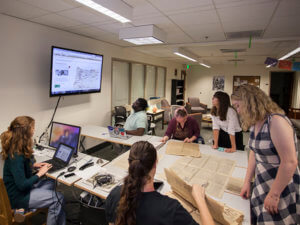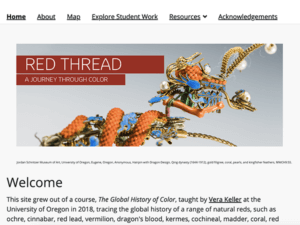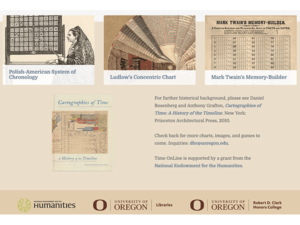University of Oregon (UO) Digital Scholarship Center (DSC)
Established in 2013
https://dsc.uoregon.edu/
Staff of Digital Scholarship Center (DSC): 2 Faculty Fellows (one each in the humanities and social sciences) with support from across the University of Oregon Libraries
Staff of Digital Scholarship Services (DSS): 10 staff members for a total of 9.25 FTE, with rotating graduate student positions and undergraduate student staff to support digitization and service point needs.
Campus Partners: UO Libraries Digital Scholarship Services (DSS); Digital Humanities @ University of Oregon (DH@UO); New Media and Culture Certificate (NMCC); Price Science Commons & Research Library
Overview

ARL checked in with Helen Chu, associate dean of libraries and chief academic technology officer, and Franny Gaede, head of Digital Scholarship Services, who described the current University of Oregon digital scholarship landscape and highlighted some initiatives in progress.
The University of Oregon Digital Scholarship Center (DSC) was established in 2013 to support and advance the university’s teaching, learning, and research in the digital humanities and digital social sciences.
The DSC’s goals are as follows:
- Fuel innovation and encourage interdisciplinary inquiry by providing ready access to experts in the digital humanities and digital social sciences, and to the wide range of technologies that enable this work
- Enhance the creation and dissemination of UO’s innovative humanistic teaching, research, and scholarship, through new forms of open access, sustainable publishing and production of digital media, learning objects, and other scholarly products
- Develop training programs, networking opportunities, and outreach events related to the digital humanities and digital social sciences, working in collaboration with faculty members, librarians, and technologists
- Establish a central, holistic gateway for external audiences, scholars, and industry to access UO’s distinctive research and scholarship in the digital humanities and digital social sciences
Digital Scholarship Services (DSS) is the umbrella department for the DSC and supports faculty members and students in transforming research and teaching using new media and digital technologies. Based on a foundation of scholarly communication, access, sharing, preservation, and evidence-based pedagogical practices, the DSS provides digital asset management, digital preservation, training, consultations, and tools and methods for digital scholarship, teaching, and learning.
The newly-opened Digital Research, Education, And Media (DREAM) Lab is a donor-funded initiative intended to facilitate continued integration and expansion of digital scholarship and educational technology services for the University of Oregon. It serves as the UO Libraries’ dedicated shared space for faculty and graduate student innovations, research-led teaching, experimentation, and consultation for the university’s efforts involving digital scholarship, research data management, and use of primary source materials and artifacts for teaching, learning, and scholarship.
Staffing and Services

The UO DSC benefits from the dedicated time and support of Faculty Fellows, library administrators, and library staff. Digital Scholarship Services (DSS) was created to support the use of new media and digital technologies in research and teaching and works closely with the Center for Media and Educational Technologies and Data Services.
The DSC is guided by an advisory council of stakeholders from throughout the university. Current members of the council include university faculty from English, history, philosophy, and sociology; a graduate student in English; the directors of the Wired Humanities Project and the Research High Performance Computing Facility; and library faculty and staff.
As it works to foster a community of practice at UO and in the region, the DSC and DSS staff offer an array of services and events for campus constituents interested in digital scholarship. The center supports research and teaching through consultation on digital scholarship projects and their pedagogical applications, and DSS staff and affiliates teach workshops on commonly used digital scholarship tools in the newly opened DREAM Lab. Popular events include a “Digital Scholarship Sampler,” in which individuals visited stations to learn more about digital scholarship tools and methods and vote on the tool they would most like to learn about at a future workshop; a workshop series on “Doing Digital Projects in the Open;” and an “Owning Your Omeka” series to support faculty interested in hosting their own digital projects.
Mindful of the many stakeholders on campus, staff collaborate with not only subject specialist librarians and faculty, but also the Center for Media and Educational Technologies, the Digital Humanities Program and minor, and the New Media and Culture Certificate programs. These collaborations engage faculty and students in workshops and other events, and promote the DSC Faculty Grants Program that is providing substantial in-kind expertise to support the development of digital scholarship projects. Digital Scholarship Services staff has also worked closely with the UO Libraries’ and Jordan Schnitzer Museum of Art’s Mellon Postdoctoral Scholar, Jenny Krieger, to build digital scholarship projects associated with the Mellon Foundation grant “Leveraging GLAM Assets in Research, Teaching, and Learning: Mellon Faculty Fellowships to Advance Library-Museum Collaboration.”
Projects
The DSC focuses on collaborative digital humanities and digital social sciences projects and partnerships between the center and university faculty and staff. Among the projects recently completed by the DSC are the Mellon grant–supported The March and the DSC Faculty Grant project Red Thread. The March, a collaboration with UO Clark Honors College professor David Frank, is a digital exhibition exploring the 1964 documentary by University of Oregon alumnus James Blue about the 1963 March on Washington for Jobs and Freedom. The Red Thread, a digital scholarship collaboration with UO history professor Vera Keller, traces the material history of the color red.
Featured ProjectsThe March
Red Thread
Time OnLinehttp://timeonline.uoregon.edu/
|
Successes, Challenges, and Opportunities

ARL asked Helen Chu to share some of the center’s achievements since its launch in 2013, and she highlighted the following:
The DSC built excellent digital scholarship projects for university faculty between 2013 and 2017, and supported and expanded understanding of digital scholarship on campus. As we grow into our next phase, the establishment of a quasi-endowment to sustain the Faculty Fellowship Program will ensure continued collaborative relationships with departments throughout the university. The Faculty Grants Program is allowing us to build upon our success in an operationally sustainable fashion.
Success can come with a price, of course. As with all digital scholarship centers at ARL libraries, the UO DSC must continually adapt to meet its community’s needs, so while the DSC is currently funded through a combination of general, foundation, and cost-recovery funds, there nevertheless is more demand for digital scholarship support at UO than there are resources to meet it.
Lastly, we asked Chu to peer five to ten years into the future of the UO DSC. One area of expansion that she signaled will be deeper collaboration with researchers in the STEM fields:
We…partner closely with the Price Science Commons and Research Library, which includes a makerspace and a 48-million-pixel visualization lab, [thus we] plan to foster interdisciplinary research and collaborative relationships between STEM disciplines and the humanities/social sciences, especially through the shared use of these facilities.
Franny Gaede added:
The new space [the DREAM Lab] in Knight Library is providing us with an opportunity to connect to and integrate with the curriculum in new ways. We’re building the skills of our undergraduate student workers, we’re helping shape the next generation of scholars when we work so closely with graduate students, and we’re collaborating and experimenting with faculty on new kinds of assignments and research projects. It’s an exciting time!
In addition to greater interdisciplinary collaborations, Chu shared two additional hopes for the future are optimization of the DSC project workflow, and financial security:
In five to ten years, I hope that the DSC will be able to demonstrate achievement of its goals through the successful completion of several research, scholarly, and grant projects that grow into baseline services for all faculty. I hope that we will have had multiple humanities and social science faculty members serve as Faculty Fellows and bring their expertise to a growing interdisciplinary approach to digital scholarship. And I hope that all these services and projects will be smoothly operationalized and financially sustainable.
Elizabeth Waraksa | 202-296-2296 | elizabeth@arl.org | July 9, 2019





